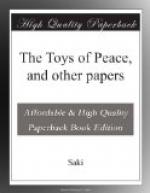“‘My dear lady,’ he cried, ’you can’t be serious. It is a beautiful and imposing work of art—at any rate one is getting accustomed to it, and even if one doesn’t happen to admire it one can always look in another direction. But imagine what life would be like if one saw that erection confronting one wherever one went. Imagine the effect on people with tired, harassed nerves who saw it three times on the way to Brighton and three times on the way back. Imagine seeing it dominate the landscape at Ascot, and trying to keep your eye off it on the Sandwich golf links. What have your countrymen done to deserve such a thing?’
“‘They have refused us the vote,’ said Lena bitterly.
“The Prime Minister always declared himself an opponent of anything savouring of panic legislation, but he brought a Bill into Parliament forthwith and successfully appealed to both Houses to pass it through all its stages within the week. And that is how we got one of the most glorious measures of the century.”
“A measure conferring the vote on women?” asked the nephew.
“Oh dear, no. An Act which made it a penal offence to erect commemorative statuary anywhere within three miles of a public highway.”
EXCEPTING MRS. PENTHERBY
It was Reggie Bruttle’s own idea for converting what had threatened to be an albino elephant into a beast of burden that should help him along the stony road of his finances. “The Limes,” which had come to him by inheritance without any accompanying provision for its upkeep, was one of those pretentious, unaccommodating mansions which none but a man of wealth could afford to live in, and which not one wealthy man in a hundred would choose on its merits. It might easily languish in the estate market for years, set round with noticeboards proclaiming it, in the eyes of a sceptical world, to be an eminently desirable residence.
Reggie’s scheme was to turn it into the headquarters of a prolonged country-house party, in session during the months from October till the end of March—a party consisting of young or youngish people of both sexes, too poor to be able to do much hunting or shooting on a serious scale, but keen on getting their fill of golf, bridge, dancing, and occasional theatre-going. No one was to be on the footing of a paying guest, but every one was to rank as a paying host; a committee would look after the catering and expenditure, and an informal sub-committee would make itself useful in helping forward the amusement side of the scheme.
As it was only an experiment, there was to be a general agreement on the part of those involved in it to be as lenient and mutually helpful to one another as possible. Already a promising nucleus, including one or two young married couples, had been got together, and the thing seemed to be fairly launched.
“With good management and a little unobtrusive hard work, I think the thing ought to be a success,” said Reggie, and Reggie was one of those people who are painstaking first and optimistic afterwards.




